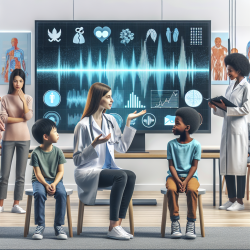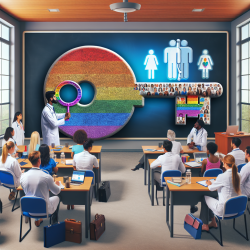As practitioners in the field of speech-language pathology, we are constantly seeking ways to improve our practice and outcomes for children. One way to achieve this is by integrating findings from various research disciplines. A fascinating study, "Biochemistry at Liverpool 1902-1971" by R.A. Morton, offers valuable insights that can be applied to our field, particularly in online therapy services provided by TinyEYE.
Understanding the Research
The research chronicles the evolution of biochemistry at the University of Liverpool from 1902 to 1971, highlighting significant advancements and their implications. While the study primarily focuses on biochemistry, several key takeaways can be adapted to enhance online therapy practices:
- Innovative Thinking: The study underscores the importance of innovative thinking in scientific progress. As online therapists, adopting innovative approaches can help us develop more effective therapy techniques and tools.
- Interdisciplinary Collaboration: The research emphasizes collaboration across various scientific disciplines. In our context, collaborating with professionals from different fields can lead to a more holistic approach to therapy.
- Data-Driven Decisions: The study highlights the role of data in driving scientific advancements. Similarly, using data to inform our therapy decisions can lead to better outcomes for children.
Practical Applications in Online Therapy
Here are some practical ways to implement the insights from the research into your online therapy practice:
- Embrace Innovation: Constantly seek new methods and technologies to enhance your therapy sessions. For instance, incorporating interactive games and activities can make sessions more engaging for children.
- Foster Collaboration: Work closely with other professionals, such as educators, psychologists, and occupational therapists, to develop comprehensive therapy plans. This interdisciplinary approach can address various aspects of a child's development.
- Utilize Data: Collect and analyze data from your therapy sessions to identify patterns and areas for improvement. Use this data to tailor your therapy strategies to each child's unique needs.
Encouraging Further Research
While the insights from the research are valuable, it's essential to continue exploring new findings and integrating them into our practice. Here are some steps you can take to stay updated:
- Read Research Articles: Regularly read research articles from reputable journals to stay informed about the latest advancements in the field.
- Attend Conferences: Participate in conferences and workshops to learn from experts and network with other professionals.
- Engage in Professional Development: Take advantage of professional development opportunities, such as online courses and webinars, to enhance your skills and knowledge.
By continuously seeking new knowledge and integrating it into our practice, we can provide the best possible outcomes for the children we serve.
To read the original research paper, please follow this link: Biochemistry at Liverpool 1902-1971.










